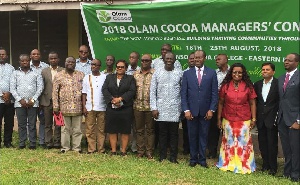 Olam officials in a group photo with COCOBOD CEO, Mr Boahen Aidoo
Olam officials in a group photo with COCOBOD CEO, Mr Boahen Aidoo
Ghana’s COCOBOD Chief has praised Olam Ghana, for its efforts in adding value to Ghana cocoa by processing beans locally, but was quick to urge the company to strive to go beyond primary and secondary processing and venture into tertiary production of quality chocolates in Ghana.
Olam Ghana, a subsidiary of the global agri-commodity giant, Olam International, and in Ghana, one of the biggest cocoa licensed buying companies (LBCs), has been producing top-grade cocoa liquor locally at the Olam Cocoa Processing facility at Kaase in the Ashanti Region since 2015.
Speaking at the 2018 Cocoa Managers’ Conference organised by Olam for all its managers and supervisors nationwide at the Bunso Cocoa College, the Chief Executive Officer of COCOBOD, Jospeh Boahen Aidoo tasked employees of Olam to lead the campaign for the consumption of cocoa locally pointing out that persons who work within the industry, should consume and encourage others to also join in the consumption of cocoa and its related products.
“Consuming cocoa has a lot of health and nutritional benefits and people who work within the industry like us must lead the campaign to get more Ghanaians to consume the produce. That will go a long way to improve the cocoa industry.”
Mr Aidoo urged all managers in the Cocoa industry to deal fairly with cocoa farmers who he described as ‘the weakest link in the cocoa value chain’, in order to ensure the sustainability of the industry, stressing that once farmers lose interest in the cultivation of cocoa, that would be the end of all stakeholders along the value-chain, not excluding the Managers, the buying companies and even COCOBOD .
He disclosed that, government on its part was doing all it could to secure the future of the industry through key interventions, including the rehabilitation of diseased and over-aged tress and the introduction of hand pollination to boost yield, while it goes into programmes to attract the youth into cocoa farming. He called for stakeholder support to ensure the success of these measures.
As part of measures to increase yield within the industry, he said Ghana, in collaboration with its cocoa producing counterpart, the Ivory Coast, is to embark on rehabilitation of its cocoa farms by cutting down overaged tree stocks and trees infected with diseases like the swollen shoot.
This comes after the two countries are said to have secured some 600 million dollars from the African Development Bank to facilitate the cutting down of over 680,000 hectors of cocoa from affected farmlands and the replanting of trees in these areas.
In Ghana, nearly 40 percent of its cocoa farms are either infected with the swollen shoot disease or the cocoa trees are overaged.
The ADB facility which is expected in the coming months, is to allow the two leading cocoa producing countries to undertake the rehabilitation project to engender substantial increase in overall production in the near future when completed.
The Chief Executive said rehabilitating the Cocoa sector id so urgent that even before the funds become available, Ghana COCOBOD has committed to invest its own funds to enable it cut down and salvage some 10,000 hectors of infected or overaged cocoa farmlands.
Mr. Aidoo told journalists after his hour-long interaction with the 200 or so Olam Cocoa Managers, that, the rehabilitation exercise was inevitable if the two countries wish to effectively combat the scourge of the swollen shoot disease and clear overaged unproductive trees and eventually increase their overall production. Ghana, he said, has its own motivation of producing far higher premium beans for the world market.
“The rehabilitation has to do with cutting down old cocoa tree stock and diseased infected tress. Currently in Ghana about 40 percent of our tree stock has been affected. And the areas that are affected add up to about 680,000 hectors of farmlands.
We were looking for money from the African Development Bank, which has been approved but we were doing that with Ivory Coast our neighbours. We believe that this project will help us in the future as we will be able to bring under control the spread of diseases and replant overaged trees as well.”
Mr Aidoo disclosed that cocoa farmers are currently undergoing sensitisation programmes to educate them on the project and secure their support to ensure the success of the exercise when it finally sets off later this month.
According to him, the exercise, code named, “Rehabilitation of diseased and overage cocoa trees,” would start from the Eastern and parts of the Western Region where the infection “is very very great,” while the other regions would join in the exercise in subsequent months.